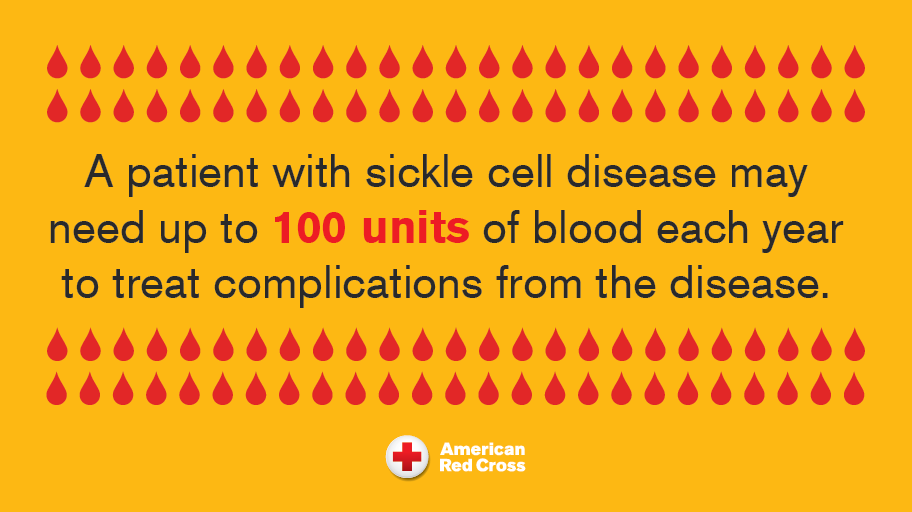Rising cases of COVID-19 due the delta variant and the arrival of already devasting hurricanes, wildfires and floods have led national headlines for months—giving less attention to rare, life threatening conditions and diseases that impact thousands of patients like those with sickle cell disease.
September is Sickle Cell Awareness Month, a time to highlight how this often-invisible and rare disease impacts over 100,000 people— most of whom are of African descent and will require regular blood transfusions to help manage their disease. Despite the discovery of the disease having taken place more than a century ago, there has been limited research and few treatments to date to help those suffering from sickle cell crisis, a troubling legacy of neglect for rare diseases—especially those that primarily affect individuals who are Black.
Below are some fast facts about sickle cell disease, why blood donations from the Black community are vital to supporting patients with this disease and how you can help.
What is sickle cell disease and why are blood transfusions important?
Sickle cell disease is an inherited disease that distorts soft and round red blood cells and turns them hard and crescent shaped, which can cause individuals to experience extreme pain. For individuals experiencing a pain crisis due to their disease, blood transfusions are essential in increasing the number of normal red blood cells in the body, which help deliver oxygen throughout the body and unblock blood vessels, helping to alleviate pain. In fact, some individuals with sickle cell disease may need as many as 100 units of blood each year. Unfortunately, this can make finding compatible blood types more difficult when patients develop an immune response against blood from donors that is not closely matched to the blood of the recipient.
Why is it vital the Black community give blood to support these patients?
For many patients, hospitals can transfuse blood products solely on compatible A, B, O, and AB blood types. However, most individuals who are Black have some unique protein structures or antigens on their red blood cells that can make it difficult to find a compatible unit of blood in other donor populations.
Because sickle cell disease disproportionately impacts the Black community, and a single patient who has sickle cell can require thousands of blood transfusions throughout their life, receiving blood from a donor with the same race or similar ethnicity often provides the best opportunity for a well-matched unit, resulting in a transfusion that is better for the patient. This is because frequent transfusions can cause patients with sickle cell disease to develop an immune response against blood from a donor that is not closely matched, and this can lead to serious complications.
Is there a cure for sickle cell disease?
Yes, stem cell or bone marrow transplants, as well as emerging gene therapy approaches, are the only cure for sickle cell disease. But these treatments are not widely available, and many are still being researched, which is why blood transfusion, as a treatment, is the most important. A single sickle cell patient can require multiple blood transfusions per year throughout their lifetime to treat complications from sickle cell disease.
Unfortunately, over the past several weeks the Red Cross has seen blood donor turnout decline by nearly 10% while hospital demand for blood products continues to outpace donations. This decline in donors is believed to be due to multiple reasons, including the continued effects of the pandemic, severe weather and back-to-school preparations for many families.
How to help
Kick off this month with a lifesaving blood donation. The Red Cross urges eligible individuals who are feeling well to please make an appointment today by visiting RedCrossBlood.org, using the Red Cross Blood Donor App or calling 1-800-RED-CROSS.
- Kick off the month with a donation Sept. 3-7 and we’ll thank you with a 16-ounce campfire mug, while supplies last.
- Score a new college football-themed T-shirt when you come to give Sept. 13-30, while supplies last.
The health and safety of everyone attending Red Cross blood drives across the country is a priority, especially as COVID-19 cases are surging again. As such, the Red Cross resumed requiring all blood donors, staff and others at our blood drives and donation centers to wear face masks regardless of their vaccination status Aug. 9. Individuals who have received a COVID-19 vaccine are still eligible to donate blood and platelets. Knowing the name of the manufacturer of the vaccine they receive is important in determining blood donation eligibility.












